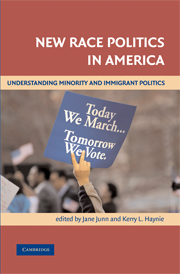Book contents
- Frontmatter
- Contents
- Contributors
- Acknowledgments
- 1 New Race Politics: The Changing Face of the American Electoral Landscape
- 2 In Whose Interest? Political Parties, Context, and the Incorporation of Immigrants
- 3 Beyond Black and White: The Experiences and Effects of Economic Status among Racial and Ethnic Minorities
- 4 Activity amid Diversity: Asian American Political Participation
- 5 Get Me to the Polls on Time: Coethnic Mobilization and Latino Turnout
- 6 Se Habla Espanol: Ethnic Campaign Strategies and Latino Voting Behavior
- 7 Structuring Group Activism: A Macro Model of Black Participation
- 8 Black Elites and Latino Immigrant Relations in a Southern City: Do Black Elites and the Black Masses Agree?
- 9 Understanding the New Race Politics: Conclusions and Challenges
- References
- Index
8 - Black Elites and Latino Immigrant Relations in a Southern City: Do Black Elites and the Black Masses Agree?
Published online by Cambridge University Press: 05 September 2012
- Frontmatter
- Contents
- Contributors
- Acknowledgments
- 1 New Race Politics: The Changing Face of the American Electoral Landscape
- 2 In Whose Interest? Political Parties, Context, and the Incorporation of Immigrants
- 3 Beyond Black and White: The Experiences and Effects of Economic Status among Racial and Ethnic Minorities
- 4 Activity amid Diversity: Asian American Political Participation
- 5 Get Me to the Polls on Time: Coethnic Mobilization and Latino Turnout
- 6 Se Habla Espanol: Ethnic Campaign Strategies and Latino Voting Behavior
- 7 Structuring Group Activism: A Macro Model of Black Participation
- 8 Black Elites and Latino Immigrant Relations in a Southern City: Do Black Elites and the Black Masses Agree?
- 9 Understanding the New Race Politics: Conclusions and Challenges
- References
- Index
Summary
The United States is becoming more racially and ethnically diverse as a function of immigration, both legal and illegal, from Asia, Mexico, and Latin America. Latinos are the fastest growing population, and in 2000, Latinos replaced African Americans as the largest minority group in the United States. Although much of the media and scholarly attention has focused on demographic changes in traditional Latino immigrant destinations such as California, New Mexico, Texas, and Arizona, the rapid growth in Latino populations is occurring across the nation. The South has undergone a particularly dramatic alteration in terms of racial composition, with six of seven states tripling the size of their Latino populations between 1990 and 2000. This settlement of Latinos in the South is no more than ten to fifteen years old, and new immigrants from Mexico and Latin America are settling in states like North Carolina, Georgia, and Tennessee (Durand, Massey, and Carvet 2000). They bring ethnic and cultural diversity to areas previously defined exclusively as black and white.
Not only have new Latino populations migrated to urban and suburban locations in the South, they also have settled in small towns and rural areas, reinforcing projections of the “Latinization” of the American South. Examples of these “New Latino Destinations” (Suro and Singer 2000) include cities such as Atlanta, Georgia; Charlotte, Greensboro-Winston Salem, and Raleigh-Durham, North Carolina; Nashville and Memphis, Tennessee; and Greenville, South Carolina.
- Type
- Chapter
- Information
- New Race Politics in AmericaUnderstanding Minority and Immigrant Politics, pp. 145 - 165Publisher: Cambridge University PressPrint publication year: 2008
- 8
- Cited by



